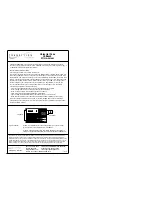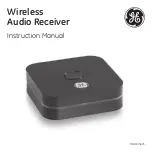
The references
a b c
etc. mentioned below relate to the illustration on page 12.
4.1 Mains power connection
The digital receiver should only be connected to the mains power supply when all the cable
connections with other components of the system have been made. This helps to avoid
damage to the digital receiver as well as to other components.
a
When you have made all the other connections, use the mains cable supplied to
connect the receiver to a mains power outlet 230 V/50-60 Hz.
4.2 External unit
4.2.1 Operation with 2 antenna signals
To utilise the full range of functions of your digital receiver, you should preferably operate it
with two separate antenna signals.
b, c
Use suitable co-axial cables to connect the
LNB inputs 1
and
2
of the digital
receiver with your external unit.
Please also note Point 6.4 (antenna settings).
4.2.2 Operation with 1 antenna signal
In exceptional cases you can also operate your receiver with only a single antenna signal. In
this case, however, both the recording function and the PIP function will only be available in
restricted form. (see point 6.4.2)
b
Use a suitable co-axial cable to connect the
LNB input 1
of the digital receiver with
your external unit.
4.2.3 Operation with a rotating antenna
b
When using a rotating antenna, connect the DiSEqC motor (Level 1.2) with the
LNB
input 1
.
4.3 Connection to a television set
When you have connected your digital receiver with your television set, it may be necessary
to adjust the signal type or the mode of the Scart socket to your television set.
d
Use a SCART cable to connect the receiver (
SCART socket TV
) with the
television set (SCART socket). If your television set is appropriately equipped, it will
automatically switch to AV, and thus to satellite operation, when the digital receiver is
switched on.
e
Connect the receiver (
HDMI output
) and TV set (HDMI input) using an HDMI cable.
If your TV set is appropriately equipped it will automatically switch this over to the
HDMI input when the digital receiver is switched on.
13
4
















































